English Words in Action, Group P
(a variety of English words which have developed through history and are currently used in our modern age)
Simply click on this banner (or the following link) and you will be on your way to stimulate your brain for greater word comprehension with quizzes based on some of the words in this unit.
Tracy dived into the swimming pool in her back yard for her exercise.
2. A small amount of liquid which is on a surface: The police found the man's dead body on the floor in a pool of blood.
3. A focus of light or an illumination on a small flat surface: When the sun came up, Shelby could see people standing in pools of light.
4. Money which is bet by an individual or a group of people on an event; such as, sports, or some other competitive activity: Who won the football pool this week?
Well, it seems that Bill lucked out and won this week's football pool.
5. An association, group, or coalition of people: Mildred was employed as a member of the typing pool.The high gas prices made Frank decide to join the car pool in order to save money.
The students were convinced that they could accomplish their project faster if they pooled their ideas and research materials.
2. To combine something to form a supply which can be used by a group: The two couples pooled their money and rented a car for the trip.After falling and injuring her back, Joan was sent posthaste to the hospital.
2. Etymology: in the 16th century, the phrase "haste, post, haste" was used to inform "posts," which couriers were then called, that a letter was urgent and must be quickly delivered.The "posts" would then gallop along a route, with a series of places at which to get a fresh horse or to relay the letter to a different messenger for the fastest delivery possible.
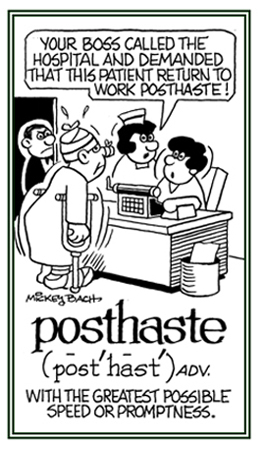
Go to this Word A Day Revisited Index
so you can see more of Mickey Bach's cartoons.
2. Etymology: from English prank, "playful trick, a mischievous act" + -ster, "a person who deceives or cheats."

Go to this Word A Day Revisited Index
so you can see more of Mickey Bach's cartoons.
2. To utter words lacking substance, value, or purpose: Scott told Abigail that he didn't have time to prate with her about the local office gossip.
3. To babble; to talk foolishly and at length; to chatter; to prattle: Gregory learned that it is better not to prate about family affairs.
Marvin continually prated about his medical ailments.
4. Etymology: from Middle English praten, "chatter".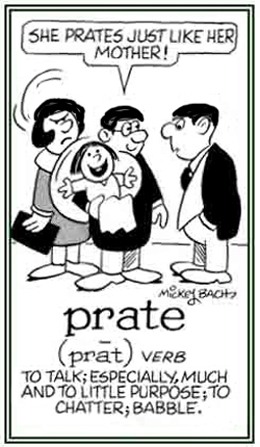
Go to this Word A Day Revisited Index
so you can see more of Mickey Bach's cartoons.
Etta was a prater about her two sons and their "wonderful" children.
2. To go on and on talking or chattering foolishly about something: Deloris loves to prattle on and on about the cute activities of her puppy.
Today we're looking for one of the most feared creatures here in the desert.
When other animals hear it, they scurry away to avoid becoming prey.
I see one! And it looks like it caught a victim.
. . . blah, blah, blah, yakity yak, yak . . . blah, blah, blah, yakity yak, yak . . . blah, blah, blah . . . .
And there it is . . . The dreaded prattlesnake!
2. Conversation or verbal interchanges which tend to be idle and shallow: Once given a forum, the senator turned out to be a prattler, going on about what a wonderful member of the Senate he was.
3. A noise or sound that may be interpreted as incoherent and meaningless: Patricia's baby was quite a prattler and she was often entertained by her little boy.
2. To make oneself neat and tidy: Shirley stood in front of the mirror preening herself before going on a date with Warren.
3. Etymology: from Latin pro-, "before" + oindre, "to trim, to cut back."
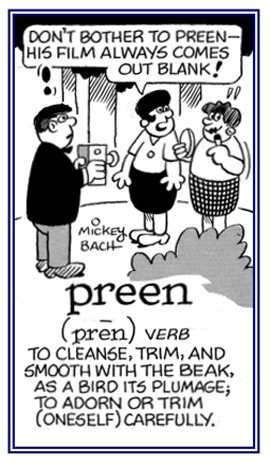
Go to this Word A Day Revisited Index
so you can see more of Mickey Bach's cartoons.
2. The wage earners collectively, excluding salaried workers: Jim's father was a member of the proletariat who was being paid hourly wages.
3. Etymology: from Latin proletarius, "a man whose only wealth is his offspring" or "whose sole service to the state is as a father."
By 1856, the term proletariats was applied specifically to the laboring or working classes of people in Europe who were characterized as having no reserve money and who depended only on low wages for subsistence.
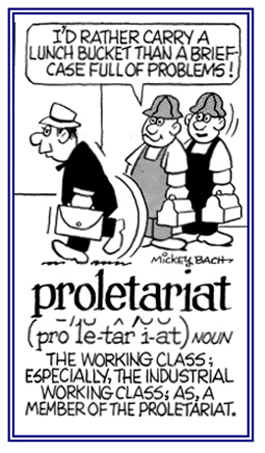
Go to this Word A Day Revisited Index
so you can see more of Mickey Bach's cartoons.
A Promethean is someone who is very clever or defiantly original in behavior or actions.
2. Etymology: from Greek mythology "one who created mortals from clay and gave them fire" from pro-, "before" + manthano, "learn, perceive."Prometheus was a demigod, one of the Titans, who was worshiped by craftsmen. When Zeus hid fire from mankind, Prometheus stole it by trickery and returned it to earth.
As punishment, Zeus chained Proetheus to a rock where an eagle fed on his liver every day, which grew again each night; then he was finally rescued by Hercules.
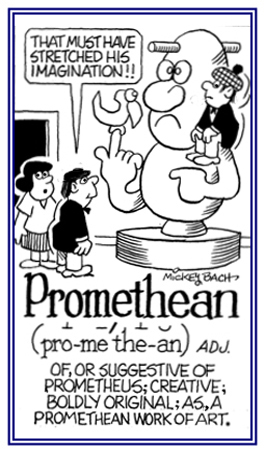
Go to this Word A Day Revisited Index
so you can see more of Mickey Bach's cartoons.
2. Relating to the variety or great diversity of skills or aptitudes a person can display; many-sided; changeable: It is believed that, as a versatile musical composer, Shostakovich's protean talents resulted in many wonderful styles of music.
3. Etymology: from Greek proteus, "sea god who could change into many different shapes."
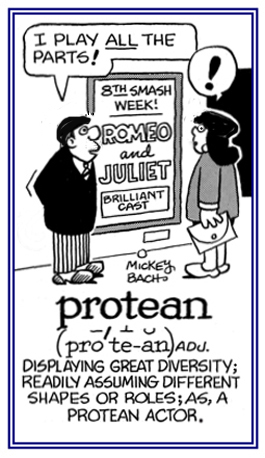
Go to this Word A Day Revisited Index
so you can see more of Mickey Bach's cartoons.
Lina had exceptional prowess as a pubic speaker for her company's financial success.
2. Distinguished courage and bravery; especially, in war: Raymond was serving his military time with prowess for which he received special recognition by his superior officers.3. Etymology: from Old French proece, from prod, "valiant." Prow was in Middle English as a noun meaning "advantage, profit" and then "valiant, brave."
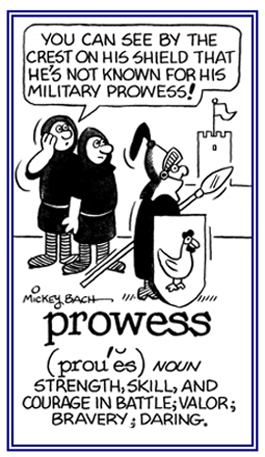
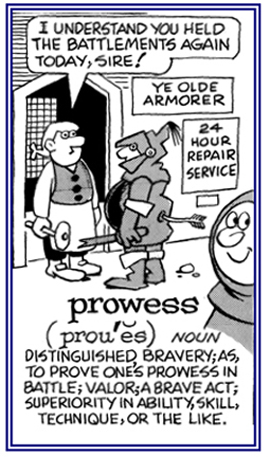
Go to this Word A Day Revisited Index
so you can see more of Mickey Bach's cartoons.
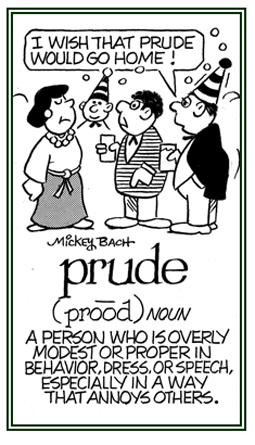
Go to this Word A Day Revisited Index
so you can see more of Mickey Bach's cartoons.
Links to all of the groups of English words in action, Groups A to Z.
You may see the bibliographic list of sources of information for these words in action.


